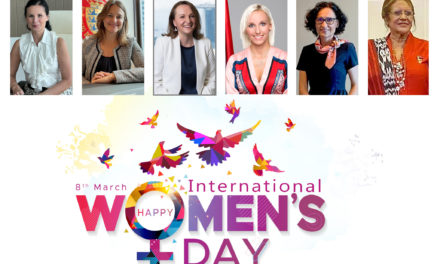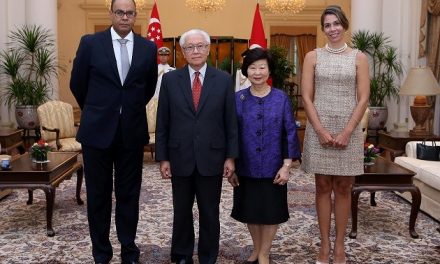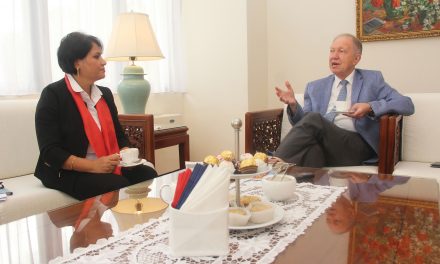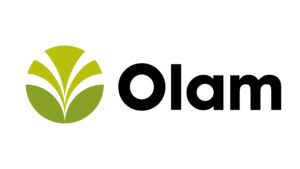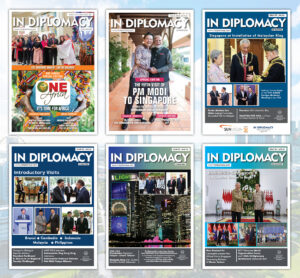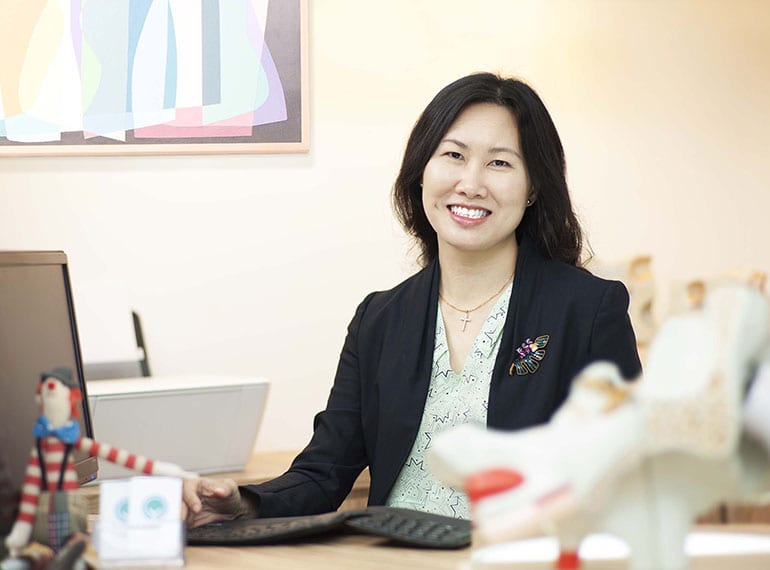
Dr. Lynne Lim, Founder and CEO of NousQ, discusses how her pioneering device, CLiKX, is set to revolutionise ear tube surgery, making it more accessible and affordable for patients worldwide.
Singapore, 28 March 2025 – In an exclusive interview with IN Diplomacy for the Ambassadors of Change column, Dr. Lynne Lim, Founder and CEO of NousQ, shared her journey of medical innovation that led to the development of CLiKX, the world’s first robotic ear tube surgical applicator. This groundbreaking device simplifies ear tube surgery, enabling a faster, less invasive procedure that can be performed in a clinical setting under local anaesthesia.
Q: As a pioneering ENT specialist and medtech innovator, what drove you to create a device that could help millions more people to hear again and what was the most significant challenge you faced in bringing this vision to life?
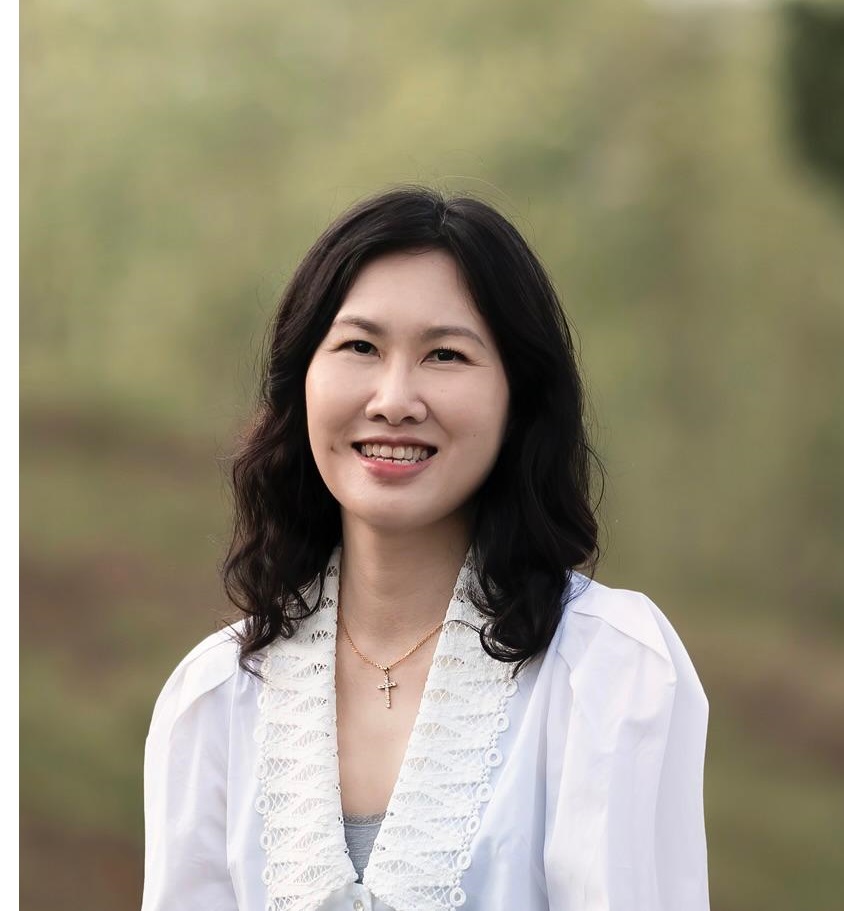
On a humanitarian mission to Cambodia many years ago, I removed neck lumps for kids who were awake, under just local anesthesia injections. However, I had to turn away so many kids who had trekked for days seeking ear tube surgeries to relieve middle ear infections. It was heartbreaking. Middle ear infection is the world’s leading cause of hearing loss in children. It affects adults too.
The usual ear tube surgery requires many different instruments, an operating theatre, general anaesthesia, and a surgical microscope. These are costly and not readily available. Back in Singapore, I saw my young daughter getting ear-ring piercings. A good lady came with a handheld device – “click, click” – ear piercings done! That was my “Aha” moment.
I worked with my cofounder engineer at the National University of Singapore, and we now have the world’s first and only robotic ear tube surgical applicator, CLiKX. CLiKX inserts ear tubes into the ear drums with just 1 click in 1 second, reducing the need for general anesthesia, operating theatre, and surgical microscope. CLiKX turns the surgery into a clinic, a local anesthesia ear drop procedure.
With an integration of novel technologies, CLiKX simplifies surgery to derisk and democratise surgery.
The biggest challenge for a start-up is getting others to believe you have something great when there is still little to show. Without an established history, a supportive network, and manpower, there is tremendous stress, with funding the biggest challenge. To raise funds successfully, you need to understand the entire business, not just the product, and identify specific segments of paying markets, non-profit or for-profit, regardless. Raising funds is a 24/7 365-day job; it invades your dreams.
Q: Your device has the potential to reduce expenditure and increase accessibility for those with ear infections and hearing disabilities. Can you share some success stories or testimonials from patients who have benefited from your invention?
A 12-year-old child in Indonesia had been having ear infections for many years, with poor speech and learning. Parents could not afford the usual surgery, and surgeons were waiting for the child to grow older for a larger ear canal that would not require the use of a microscope for surgery. The look of disbelief on mom’s face was precious when CLiKX inserted the ear tube with just 1 click, with immediate hearing improvement with the child awake.
Another 3-year-old child had ear tube surgery with CLiKX awake. 5 minutes later, he was eating roti and preparing for home. For his dad, not having to worry about general anaesthesia and days or hours away from work was a big plus.
An adult doctor chose to have the surgery without even local anesthesia ear drops. With the CLiKX tube insertion, she rated the pain to be less than that of a vaccination. These are all huge encouragements to us.
In human clinical trials in Asia, CLiKX has shown safety and a high success rate.
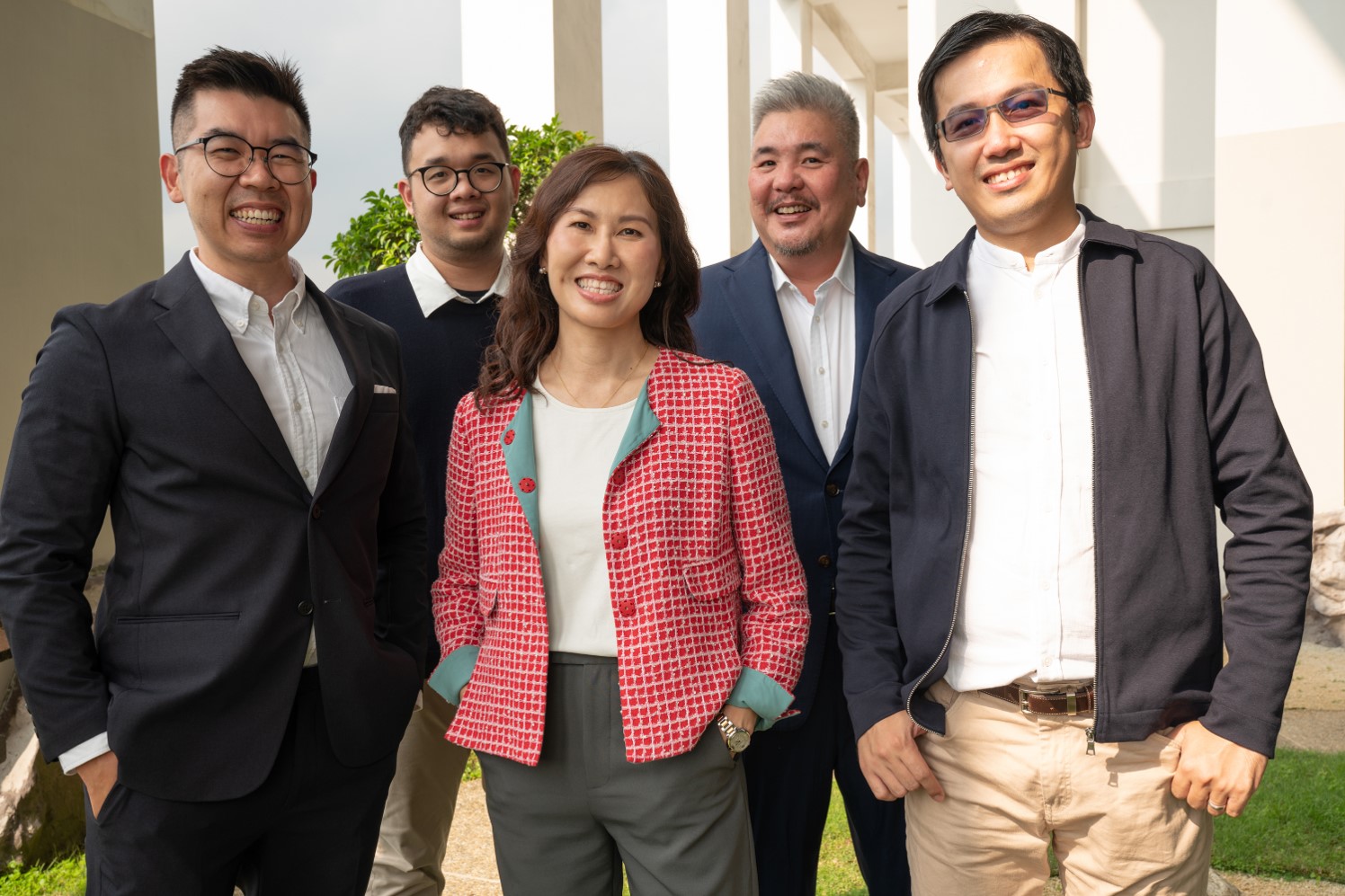
Q: As a woman in STEM, you’ve broken barriers and inspired countless others. What advice would you give to young girls and women who aspire to pursue careers in science, technology, engineering, and mathematics?
There is no reason why women cannot do STEM. It is just a matter of interest and exposure to STEM. We do not need to turn this into a bra-burning or feminist issue.
If it is the right thing for you, and the right thing to do, just take the first step and start. There is no perfect plan, time, or team. You are not too young, and never ever too old. You will go up against big challenges, but that goes for anyone working to make things better.
You are more than enough, and the time is now!
Q: You’ve raised funds in multiple geographies and been an ambassador for a cause. What strategies have you employed to build support and mobilize resources for your mission, and what lessons have you learned along the way?
Despite this being a medtech business, it is really at the heart of it all, a people business.
It has been a very tough 2 years fundraising, especially for early-stage pre-revenue disruptive invasive surgical device companies. This specific ecosystem is also less mature in the East.
Over the last 3 years, I have met with and discussed CLiKX with over 130 ENTs in Asia, the USA, the EU, the Middle East, and Africa – it is really important to build genuine relationships and get honest feedback. I have travelled East to West, except for the African continent, to understand not only product viability, but also commercial viability. Direct end-user feedback provides the best and nuanced understanding of eventual use potential. That also allows us to refine our product before it reaches the patients and surgeons.
I have engaged with all domains of investors – individuals, HNW, impact-focused, ROI focused, family offices, VCs, and corporates. The tough times forced us to be agile and learn continuously. I learnt to start with the end in mind, to build a better product and strategy. This helped with fundraising.
Investors want to see skin in the game, commitment, and resilience. They have to like and trust you. Naturally, a great product, a large market, potentially large ROI are important. Many of our investors are also big on the return of impact. It has been a hard slog, but NousQ is blessed to have a special family of shareholders who are in the know and supportive.
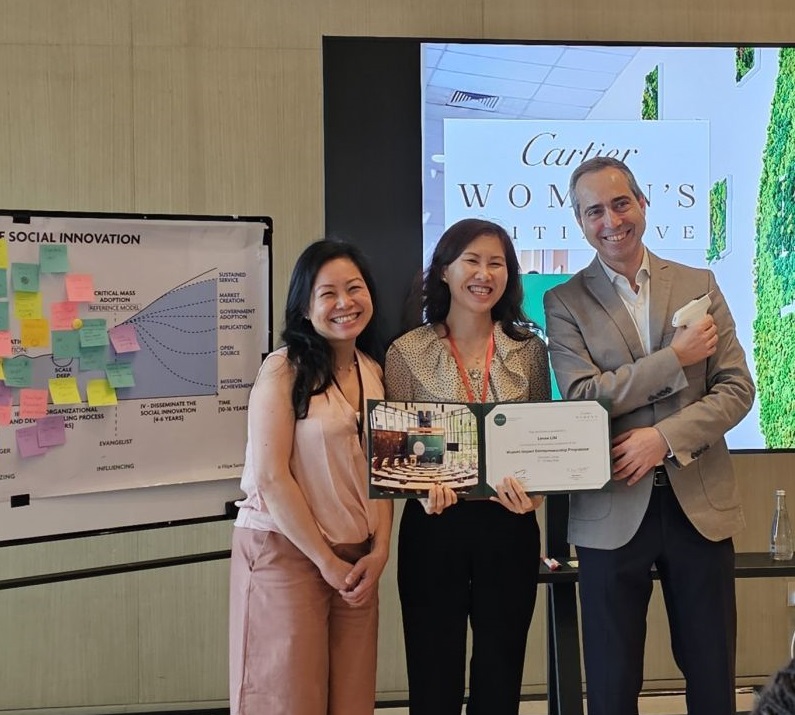
Q: As we celebrate International Women’s Month, what do you believe is the most pressing issue facing women in healthcare and medtech today, and how can we work together to address it?
The most pressing issue facing women in private start-ups in medtech today is building meaningful networks. It is key to focus on learning the investment, business, and corporate side of things quickly, not just the product.
We need to network more, get out of our comfort zones and geographies. We must support each other generously.
Women-focused funds and mentors would be helpful, funds that go beyond the traditional education, social, e-health side of things that many women work on. In America, I see more women-focused medtech funds, and in Europe, more women-focused impact funds. In Asia, a lot less.
Q: Your legacy extends far beyond your device – you’re inspiring a new generation of leaders and innovators. What values or principles do you hope will be remembered as part of your legacy, and how do you envision the next generation of women in medtech carrying forward your work?
I hope to encourage all women not to overthink it, take the first step, then just continue plugging. I hope to be remembered for having done my best with good cheer. To have done some good whilst passing by this fragile but beautiful world.
The next generation of women will be global, agile, and sure of their place under the sun. They have sponged up technology even as babies, and have had the privilege of all types of information within 1 minute of online search. They are well-positioned to be doing greater stuff together.
Q: Can you share a personal anecdote or story about a moment when you faced self-doubt or adversity, and how you overcame it to achieve your goals?
I have self-doubts often, before founding the company, almost every 3 months, and even now. If you have high expectations and know enough that you do not know enough, it would be hard not to have self-doubt – we all want the best for our company. But that keeps one on their toes, and keeps one learning voraciously. In a startup, almost every 2 weeks you have a new challenge. It is the norm.
To overcome these, you often need to have a strong belief that you are doing this for something bigger than yourself, or you need to be built rather differently – it is hard to put a finger on it. I do not do anything special to overcome adversity – just do good old-fashioned hard and smart work, pray, and behave in such a way so that people want to help you.
Q: How do you think we can create a more inclusive and supportive ecosystem for women in medtech and healthcare, and what role can men play in advocating for and empowering women in these fields?
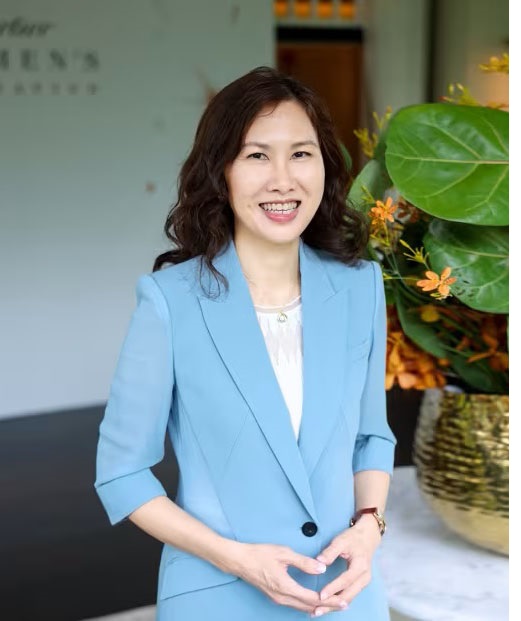
There are still many in the ecosystem who think that women are less committed to staying the course, or not aggressive enough to compete successfully. In reality, this is just a lack of understanding. Women compete in subtler and more gracious ways; their decisions are often considered, holistic, and sustainable. People mistake quiet for meekness – they are often underestimated.
On the flip side, women are often their own worst enemies. We need to believe in ourselves, take that leap, and stop trying to be perfect. We need to have more fun.
Lucky are those ladies who have men who support women doing their stuff; men willing to share their expertise, networks; men willing to share the housework and caregiving of young and old. I have met many such wonderful men; I have been lucky.
Q: Your work has had a profound impact on the lives of people with ear infections and hearing disabilities. What’s next for your device, and how do you see it evolving to address emerging needs and challenges in the field?
We are planning for CLiKX to clear regulatory approval and be in clinical use by the end of the year in Singapore and neighbouring countries. We will be working on clinical trials in the USA to get FDA approval next year.
We are always improving the device and developing other products. We will uphold the mission to innovate smart solutions that simplify surgical procedures and diagnoses, to derisk, optimise, and democratize surgery.
We want to always remember the “Q” in NousQ. The Q is a reminder to Question everything and seek a better solution; a reminder of our Quest to really listen to the patient.
Q: As an ambassador for a cause, what message would you like to share with the global community during International Women’s Month, and how can we collectively work towards creating a more equitable and just world for all?
Our mission is for smart solutions that simplify, derisk, and democratise surgery. Even in developed countries, there is tremendous inequity. There are currently only an estimated 18 million ear tube surgeries done yearly globally. There are an estimated 100 million more patients needing ear tube surgeries, and not getting surgeries with the current surgery.
We do not need big robots, shiny surgical facilities, big names, or complex AI. The greatest and most sustainable impact can be from the simplest of things that reduce cost and risk.
We can collectively work together to go back to basics and really focus on the patient. Healthcare is highly complex. Many a time, the priorities of healthcare systems, insurers, physicians, and drug and device companies overshadow those of the patients. Many patients have no real voice.
For a start, if there is a formal patient body, a formal patient representative whenever key decisions or policies are made for the patients, that would be really helpful. No one can advocate for the patient as well as the patient.

